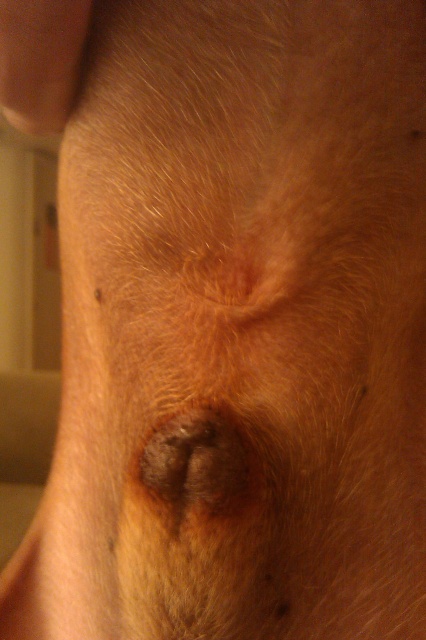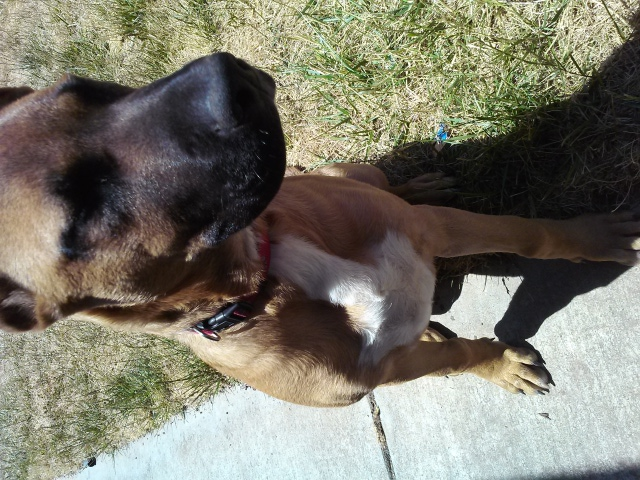QuestionMy 8 year old Rat Terrier is very itchy all the time. She is treated monthly for fleas (which she does not have) bathed regularly, she is on a daily allergy medication,and a daily oil supplement. She will scratch herself raw, whether by her paws, mouth, or under a chair. Her skin is pink and irritated looking, and in those spots her fur is turning red. What could be causing this and what can I do to ease her discomfort?
AnswerHi Heather,
Thank you for writing to me about your Rat Terrier who is itchy all the time.
The first thing I would want to address is the flea monthly flea treatments. If you look at the ingredients you will notice that they are poisons. These poisons are being absorbed by your sweet dog and wrecking havoc on her immune system. Your dog doesn't have fleas so it's time to stop the baths. If in the future, your dog does get fleas, write to me and I will send you a natural protocol.
The next subject I want to address is vaccinations! Vets have been over vaccinating which can cause allergies and auto immune disease. What is the relationship between when your dog was last vaccinated and the start of the symptoms? Even if the vaccinations didn't directly cause
this problem, I would refrain from vaccinating except for a three year rabies shot. Go to the following page and follow the links:
http://www.google.com/search?hl=en&ie=ISO-8859-1&q=vaccinations%2C+dogs%2C+dange...
From your description, I would say, that your precious dog may likely be suffering from allergies. You will also want to explore all the cleaning agents you use, the lawn care products, new carpets, etc. I personally only use Dr. Bronners and vinegar to clean with. In the bathroom I use a small amount of chlorox and then clean over that with Dr. Bronners.
Addressing the food and food allergies:
Food May Be the Cause of Your Dog's Skin Problems.
Food allergies or sensitivities are usually the last suspect in detecting the cause of a dog's skin problems. Most dogs are fed the same type of dog food for years, so the food is rarely suspected. Dogs, like humans, can
develop a sensitivity to any food or additive at any time.
It is estimated that 10 to 15 percent of all allergic skin diseases in dogs and cats is caused by food allergy.
Common Ingredients
Dog food is made up of a combination of ingredients. The most common ingredients that can cause problems in a dog include:
beef
chicken
corn
eggs
fish
lamb
milk
preservatives
pork
soy
wheat
whey
Symptoms
Itchy skin is the primary symptom a dog suffers from food sensitivities.
Other symptoms may include:
anal itching
ear inflammations
hair loss
licking front paws
loss of appetite
face rubbing
head shaking
These following symptoms may manifest but are rare:
asthma like symptoms
behavioral changes
diarrhea
flatulence
seizures
sneezing
vomiting
Steps of Prevention
Be sure to eliminate all the foods in the dog's diet that match the list above, and feed your dog a commericial or homemade diet consisting of ingredients the dog has never eaten before.
The homemade diet should consist of two parts starch and one part protein.
Although duck, salmon, venison, and rabbit are suggested for the protein; pumpkin, sweet potatoes, and squash for the starch; soy and rice are not safe substitutes.
Duck and potato or fish and potato are a good start.
You may be able to select a special commercial dog food blend that suits your dog's needs.
Whatever diet you choose for your dog, it should be the only food the dog ingests during the elimination period.
This means no table scraps, dog biscuits, dog bones, rawhide chews, vitamins, minerals or chewable heartworm pills.This elimination diet is only temporary and once you find out what your dog is allergic to you must
start to add other ingredients to make a complete meal for your dog.
If symptoms begin to improve during the elimination period, you can then reintroduce each of the eliminated food items one at a time. Each food should be tested for a week before another is introduced. This will allow you to pinpoint which foods may be causing problems if symptoms resurface.
Once the offensive food is discovered, then reading dog food labels should help you pinpoint a food that meets the needs of your dog. Although there are many hypoallergenic dog foods on the market, be sure to read the labels carefully. Foods like Solid Gold Fish and Potato might work
wonders for your dog. You can also try Spot's Stew, Avoderm, Venison,Nature's Logic, Paul Newman etc, or continue to make your own food at home. At
least that way the food is fresh and you know what has gone into it. A helpful book is Natural Health for Dogs and Cats by Dr. Pitcairn.
There is a site on dog health which includes great information about allergies and the best way to feed your dog. I urge you to spend some time studying the information that this wonderful site has to offer.
http://www.shirleys-wellness-cafe.com/animals.htm
Of great importance is to have a blood panel done which includes allergy testing and most important a thyroid test.
The best of luck with your dog's health. Once you find the cause of the problem, your dog will be feeling healthy and chipper again.
Best,
Shelley Davis

 Found Dog
Question
this is what it looks
Hello my is sara and my
Found Dog
Question
this is what it looks
Hello my is sara and my
 dog breed unknown
Question
dog breed unknown dog breed unknown &nbs
dog breed unknown
Question
dog breed unknown dog breed unknown &nbs
 maltese with brown ears
Question
maltese
we bought a dog and owner said its pur
maltese with brown ears
Question
maltese
we bought a dog and owner said its pur
 Dry Dog Foods
Question
Prince Duke & Princess
I have two B
Dry Dog Foods
Question
Prince Duke & Princess
I have two B
 Mastitis
QuestionQUESTION: Good morning Karen.
My Pomeranian is
Mastitis
QuestionQUESTION: Good morning Karen.
My Pomeranian is